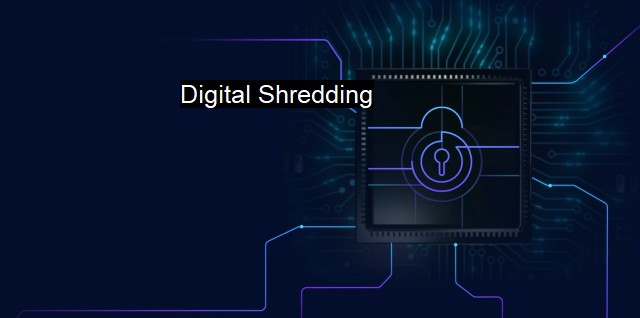What is Digital Shredding?
The Power of Digital Shredding: Advancing Cybersecurity in a Digital World with Antivirus Software and More
Digital shredding, in the context of cybersecurity and antivirus protocols, is an essential process that involves the permanent deletion of digital files and documents from storage media, making it impossible to retrieve or recover them. This method is akin to the physical destruction of paper documents using a paper shredder, hence the term 'digital shredding.'Digital shredding differs from the standard deletion processes. When a file or document is deleted, it typically remains on the computer hard drive, and savvy operators with the right kind of recovery software might retrieve it. Digital shredding, on the other hand, irrevocably destroys the file or document.
Digital shredding is foundational in a time overrun by cybersecurity threats. Cybercriminals often use our discarded or thought-to-be-erased information for malicious activities as personally identifiable information, financial data, health records, online transaction records and sensitive corporate information are incredibly valuable.
While antivirus software is proficient at detecting and neutralizing threats, protecting stored data requires additional measures. Here, digital shredding plays a very crucial role. It ensures that even if your device falls into the wrong hands, your sensitive data is safely obliterated.
Digital shredding employs high-level file erasure algorithms that make data recovery practically impossible. The process involves rewriting the sectors of the storage media where the file rested with random binary data, making original data irrevocable. With multiple passes, the remnants of any shredded data are increasingly randomized, thus minimising the chances of recovery.
It is critical to know that digital shredding is an irreversible process. Once a digital file is shredded, it is gone forever, and retrieving it is not feasible. It is a common practice in moving office spaces, disposing of old computers, or transition to new computing environments. Its use is also skyrocketing with the demonstrated need for personal data privacy and corporate data confidentiality.
In the sphere of cybersecurity, digital shredding helps uphold data integrity. It ensures that confidential information, be it personal or corporate, does not fall into the wrong hands. Various sectors like banking, medical, government, and other businesses which frequently work with sensitive information, find it an invaluable tool. For an individual, digital shredding offers the security of knowing that private information, which might include tax returns, financial transactions, personal images or videos, isn't available for potential misuse. Be it disposing of an old memory card or selling your used smartphone, digital shredding proves beneficial in an array of situations.
Antivirus software and digital shredding complement each other in a well-rounded cybersecurity program. While antivirus software monitors and mitigates threats, digital shredding assures the complete erasure of potentially compromising data from the user's storage device. Digital shredding primarily secures the 'at rest' data on our storage devices. While frequently overlooked, this is just as crucial to protect as the 'in transit' data, which is typically the focus of antivirus protections.
Digital shredding also serves the crucial purpose of ensuring compliance with various data-protection and privacy laws worldwide. With regulations such as General Data Protection Regulation (GDPR) and Health Insurance Portability and Accountability Act (HIPAA) demanding specific data destruction processes, digital shredding tools have proven essential by guaranteeing complete erasure of sensitive data. Failure to adhere to such laws can result in hefty penalties for organizations.
Digital shredding, while often overshadowed by the hype around encryption and antivirus software, is an indispensable element of a comprehensive cybersecurity strategy. It offers tangible safeguards for data privacy and security, adds an essential layer of protection to our static data, and satisfies various legal requirements. Given the increase in cybercrimes, data breaches, and a collectively greater need for data privacy, digital shredding is a necessary activity for both individuals and organizations alike.

Digital Shredding FAQs
What is digital shredding?
Digital shredding refers to the process of securely deleting digital files or data from a device or storage medium to prevent unauthorized access or retrieval of sensitive information.Why is digital shredding important in cybersecurity?
Digital shredding is important in cybersecurity because it ensures that sensitive and confidential information is permanently deleted from a device or storage medium, thus preventing unauthorized access or theft of data.What are the benefits of using digital shredding software?
Digital shredding software provides many benefits, including secure deletion of confidential data, prevention of data breaches and identity theft, compliance with data protection regulations, and reduced risk of legal liabilities.How can I ensure that my digital files are securely deleted?
To ensure that your digital files are securely deleted, you can use digital shredding software or services that use advanced algorithms and encryption techniques to overwrite and destroy the data. You should also be sure to use reputable antivirus and cybersecurity software to protect your device and prevent data breaches.| | A | | | B | | | C | | | D | | | E | | | F | | | G | | | H | | | I | | | J | | | K | | | L | | | M | |
| | N | | | O | | | P | | | Q | | | R | | | S | | | T | | | U | | | V | | | W | | | X | | | Y | | | Z | |
| | 1 | | | 2 | | | 3 | | | 4 | | | 7 | | | 8 | | |||||||